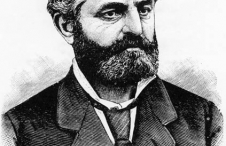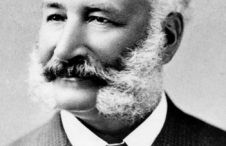Herman Bien
Herman Bien arrived on the Comstock with experience in San Francisco as a musical playwright, teacher, editor, and rabbi. He played all of these roles in Nevada, as well as that of state assemblyman.
Born in Germany in 1831, Bien immigrated to New Haven, Connecticut, and, in 1856, moved to San Francisco. A proponent of the new Reform Movement in Judaism, he was regarded by many as too liberal and secured only part-time rabbinical work. He produced a successful German language musical and published the West's first Jewish newspaper before moving to Nevada in 1864.
Jews on the Comstock had a cemetery, benevolent associations, and two B'nai B'rith fraternal lodges with a combined membership of 111, but no permanent congregation or synagogue. Bien was the Comstock's first rabbi, and assumed a congregation would form around him. Within a few months he produced a popular play, opened a Jewish day school, and took over editorship of the German-language newspaper. Although he led High Holiday services, a group of laymen organized a competing service using another ritual. Language and religious custom divided Comstock Jews, and no permanent congregation took root there. Nevertheless, Bien was the rabbi-on-call for marriages, burials, and other religious services. There is no evidence that he ever met Jacob Sheyer, who was a rabbi and merchant in Carson City.
Bien achieved popularity as an eloquent Union partisan and was elected to Nevada's first legislature in 1864. During the four-month session, he spoke forcefully on major issues, provoking the Gold Hill News editor, with whom he traded barbs. Bien authored a favorable report on Storey County education, but singled out one school as fit for a grand jury investigation. He exposed improprieties within the county's Board of Education and alienated a few prominent politicians. Having weathered that storm, he introduced legislation to abolish the death penalty. The Judiciary Committee recommended passage, but the legislature adjourned before taking action.
The talented Bien's tenure in Nevada was productive and controversial. He left in the summer of 1865, married and fathered four children, working as pulpit rabbi in Chicago and Vicksburg before his death in 1895.
Article Locations
Related Articles
Further Reading
None at this time.

